Text
the big three questions of media analysis: what the author wanted to say, what they actually said, and what they didn’t know they were saying
47K notes
·
View notes
Text
People can handle evil characters(for the most part--usually they twist their behavior and water it down) but people really can't handle good characters that lose their head or lose themselves and have a moment of fallen grace. Fandom has shown this time and time again. They really look at them as worse than the initial evil.
13K notes
·
View notes
Text
"There is no correct answer in trying to stop cursed spirits from forming, but the way Suguru goes about it is not completely wrong."
Hi! This is the line I got stuck on, because you are not wrong. From a cause-and-sought-after-effect, in the means-justify-the-objective, sort of way, Geto's logic is flawless. Eliminate the source, no more cursed spirits, hooray! But I always think these sort of solutions miss the forest for the trees, or in this case, the trees for the forest. I was completely shocked.
Why are cursed spirits a problem? I have not watched the series from the beginning, but I imagine it is because they cause death and suffering. So the thing we want to avoid is.... death... and suffering.... so causing more death and suffering in turn is not a solution, it is demented! The thing is that by this decision, Geto has determined normal human life is less valuable than the life of.... not normal humans? (I forget the term. Spirit users? Well.) Because they have the ability to produce harm by unknowingly creating spirits. By the same token, one could take the powerful humans and declare them less valuable by pointing out that while they might be sworn not to, they can very much intentionally cause harm to huge effect, as case in point Geto clearly demonstrated. Down that path lies hell all around.
The truth is, he wrapped his identity up in what he could do. Then he learned he did not enjoy, or truly had enough heart to, do what he was doing long term. Instead of stepping aside, he grasped at another way to put his abilities to use while avoiding what he detested.
Characters like these can truly drive me mad.
Jujutsu Kaisen
Going into this anime, I had never really seen any of it before. Many of my friends have gushed about the anime and kept on saying how good it was, but I had never really watched it. One of the first things that I noticed when watching was just how amazing the animation was. It was really well done throughout the show and all the fight scenes were crazy. The level of detail and the sleepless nights the animation team went through were definitely worth the final product. The big idea that I saw was about how there is no correct answer. What I mean by this is about how Suguru plans to free the world from cursed spirits by killing all of the normal people of the world. There is no correct answer in trying to stop cursed spirits from forming, but the way Suguru goes about it is not completely wrong. Another theme or idea that I saw was the term of Shinto within the anime. The example being in when Satoru unleashes his hollow purple cursed technique. The way that he floats above the ground and how he begins to view the world just before unleashing the technique displays how connected he is with the world in that moment. I believe in that moment Satoru is one with nature and nature is one with him. Another interesting theme that I noticed was the preservation of childhood innocence. This being of how Riko tried to enjoy her remaining childhood for as long as possible before she lost it. I found it ironic that she was able to preserve her childhood through her death. It was a great anime and I'm glad I was able to watch it. I will definitely look into watching the remainder of the show.

1 note
·
View note
Text

So, I had heard good things about Jujutsu Kaisen, and I think those good things were accurate. I also think that my sixth sense that had me unwilling to commit by sitting down and giving it a go were correct. This is a good high quality series that is simply not my kind of series. I am glad to take that off my checklist.
On to the themes explored here, I think there's a bit about sacrifice, about love, about identity, about confidence, about the value of life, about futility, about heritage, about tradition, about individuality, about jealousy, about purpose, and about growth. It's a good well-handled mixed bag. If I had to pick an outstanding theme on the particular arc we watched... and especially one relevant globally...
Ok, I began writing this during the fourth episode, and then Geto starts off the fifth by suggesting genocide. And then he murdered a village. And then asserted that he killed a village not in a fit of rage, but out of genuinely genocidal intentions. And that completely changed my outlook. These episodes are about losing sight of what matters, these episodes are about losing hope and sense, these episodes are about the devaluing of life, of human life.
It is relevant, because it is a common little social trick that pops up in history ever so often. Take any population on any demographic, highlight the negative aspects in them that are in truth contained in the whole of humanity, and now you have an excuse! You have an effective excuse to dehumanize, begin calling this group of people any number of names, like, monkeys, and then do away or abuse at to your convenience! Without realizing, or perhaps uncaring, that if any one individual of humanity that can be stripped down to functionality and cost-benefit and left with no inherent value as a living being, then this is just a very thinly hidden way to do that to yourself. The moment you buy into this narrative, the moment you have to justify another's very existence and therefore your own, the moment being alive is not enough to grant anyone inherent value, you have objectified the whole of humanity, and made then no cost-benefit analysis makes any sense. You have to qualify things as good or bad based on... not living people. Not quality of life. Nothing. Nothing matters at that point. And then the world just becomes a drier, colder, more hostile place. Congrats! You have shot yourself in the foot!
What I mean to say, being shown a genocidal character and recognizing the stupidity of their philosophy is so essential, it is so necessary for the health of everyone. Holy mother.
I might actually watch this series on my own now. What the.
#jpt2025jan#I did NOT expect that#what the#anime tends to take on ´genocide´as an issue more than any western media ever does I think
3 notes
·
View notes
Text
Hi Keenanrutledge! I have to completely agree with your analysis. It took me a hot second to connect all the elements of the movie into a comprehensive whole, but ultimately, I came to the same conclusion, that this film works as a cautionary tale for the accumulation of powers- political, governmental, military, and scientific. When you open up opportunities, people will use them, for good or for ill, and opening up that opportunity is a choice to consider already. Do you research how to make an atomic bomb psychic child? Does a populace allow the dissolution of their civilian rights in case of an emergency? The moment the choice is made, you are opening a door you have no control over, but that someone, somewhere, eventually, will learn how to use. I think its incredibly important that that line is repeated twice in the movie.
Akira

Akira is a dystopian anime film set in Neo-Tokyo, a city that had to be rebuilt after an explosion had destroyed the original city of Tokyo. The story is based around 2 teenagers named Kaneda and Tetsuo who are members of a biker gang. After Tetsuo got into a motorcycle accident, he gained psychic powers. We come to find out that these powers are linked to a secret government project involving a mysterious figure named Akira. As Tetsuo begins to lose control of his powers, Kaneda and a group of rebels lead a charge to try and stop him. As a whole, the movie serves as a warning about the dangers of unchecked technological and scientific advancement.
Akira gives us a look into the dangers associated with rapid urbanization. In the film, the city of Neo-Tokyo is portrayed as chaotic and plagued by inequality, crime, social unrest, and overpopulation. Society seems to be on the brink of collapse, with things like corrupt public officials and violent protests exemplifying the city’s social and political instability. The movie also explores how dangerous it can be when the military tries to control science. This is shown as secret government experiments dealing with psychic powers lead to terrible results.
Akira also explores how societies tend to deal with trauma after disaster strikes, a theme that has commonly been brought up throughout many of the previous viewings. Akira, in particular, depicts a massive explosion that destroys large parts of the city in a similar fashion to the bombings of Hiroshima and Nagasaki. This film, as well as many other anime, use imagery to represent how the memory of war and tragedy continues to shape Japan and Japanese culture.
3 notes
·
View notes
Text
I'm surprised to hear the movie is the anime compressed! The pacing and the structure of the movie was so enjoyable and felt so natural to me that I was convinced it was a spinoff or a sequel, that Violet during the war and her connection to the major, perhaps, was the focus of the anime. This makes me quite glad actually, because I was considering making time to watch the main series, since the quality of storytelling was compelling, but in a way, I already did!
I completely agree with your analysis. This movie is, over everything, an exploration of finding support from others in order to learn how to move on, and a beautiful one besides.
Violet Evergarden: Recollections
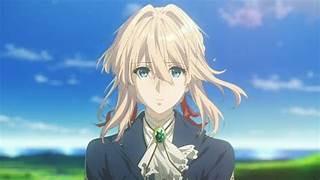
Violet Evergarden: Recollections is a film that condenses the key events from the Violet Evergarden anime series into a cohesive video. The story follows a former child soldier named Violet who becomes an Auto Memory Doll, or someone who writes letters for others, after the war. Throughout the film, Violet is in constant struggle with her emotions and the weight of her past. As she wrote letters for people dealing with love, loss, and healing, Violet would slowly begin to better understand her own grief, emotions, and connections.
The film Violet Evergarden: Recollections takes a deep dive into the real-life consequences associated with emotional repression. This is portrayed in Violet’s struggle to understand and express her feelings after experiencing the horrors of war. It proves to be very difficult for Violet to recognize things like love, grief, or empathy. This reflects a larger issue in the real world, where society generally faces challenges in acknowledging and addressing emotions. Mental health is a growing topic globally today and it is unique for popular media to comment on it. As a whole, Violet Evergarden: Recollections works to emphasize that emotional connection is vital for recovery and personal growth.
Violet Evergarden: Recollections also works to comment on the importance and complexity of things like communication and understanding in human relationships. In the film, Violet learned to convey other’s emotions through writing letters for them. The movie also portrays how people tend to struggle to express themselves when dealing with strong emotions. This is especially relevant today with modern technology. It can be difficult to maintain genuine connections with people when not communicating face to face. Violet's growth in emotional understanding show the power of sincere communication, even in its simplest form.
2 notes
·
View notes
Text

Violet Evergarden: Recollections
This is a very interesting story which, I believe, is about relearning to live. About understanding how to move forward when the context that grounded you is gone.
Violet does not know how to live outside the context of the army or without the major.
Spencer Marlborough does not how to live after his parents' deaths.
The writer does not know how to live a life without his daughter.
Ann does not know how to live when she is facing her mother's imminent death.
It is, also, of course, about learning oneself, recognizing one's own emotions and that of others, which is what Violet is more immediately trying to learn from moment to moment. I think the way this movie frames stories, narratives, real and fictitious, as a means to reflect inward is... very accurate to my own life experience. Once, I was overtaken with a deep sadness that I could not externalize, and reading a tragedy that allowed me to cry. Sometimes, trapped in our own experience, we cannot work through our emotions, even our thoughts, and seeing them reflected back at us in another one's experience is a gift.
And in the context of the movie, of course, war underlines everything. The effects of war has on communities, on people, and on people's connections to one another. War is a context stripping machine. a connection snapper, a massive life destructing force, and it starts and ends by human choice. Exploring the effects it has on people is always a relevant practice to encourage globally, so that we might avoid it to the best of our ability. And so that we may have some idea of how to live, when we fail.
And so, of course, this movie ends with... is it recollections? Is it remembrance? The idea of a person being connected to us beyond death. The power of words and memories and the knowledge of love.
"A loved one will always watch over you."
This is truly a lovely movie.
3 notes
·
View notes
Text
I had never before watched Akira, despite knowing it was iconic and that many animated productions make sure to make a tribute to the Akira slide. It was about time I sat down and gave it the time of day.

The first things that stood out to me was how clearly it played into, and perhaps even helped define, the concept of the cyberpunk dystopia. I liked that it clearly referenced the power of distraction (the news anchor constantly being cut off by, uh, cartoons and action flicks, the consistently present usage of drugs and such) and violent supression (soldiers shooting to kill, student protests repressed, no apparent way tp defend right in the face of an opressive government.) I had often heard it was one or the other in media, but Akira shows us a reality that uses both, and on its own, it would be enough to make it terrifying. The militarization of the streets, state of disrepair of the school, the casual violence of adult figures in authority positions towards teenagers, the naming of protestors as terrorists, the human experimentation- there are many details that build upon each other to create a grim picture that feels like an eerily appropiate warning. This is the potential of governments everywhere if democracy is not safeguarded and the separation of powers is disregarded, which is something relevant globally.
Something that took me by surprise was Kaneda's casual misogyny. It felt overt enough and ridiculous enough that it seemed to form part of the greater web of commentary about the world, so I was not bothered, but I didn't expect it. I always assumed the protagonist of this movie would be a... unambiguous paragon. Why I assumed this escapes me completely.
The animation has a fascinating balance between the realistically expressive, exhaggerated effects, and stylization. Some of the imagery is truly haunting in a variety of ways. Tetsuko's torment is especially well made, making his fear and confusion easy to grasp. I adore that the power effects are not visualized- you see the power through the effects of it, and it is a glorious demostration of skill from the animators.
It was an incredible expirience that I think I will need time to think over.
4 notes
·
View notes
Text
Hi, JayThomas! I definitely agree with your reading of the series. Sometimes the best way to unmask a worldview is to take it at face-value and ask whether it works on application or no, and the exaggerated stereotypes presented are definitely a way to do that. All the while the series manages to be incredibly fun. I wonder which depictions of the countries would be best received, sort of let people feel they are in on the joke rather than a bullied party.
I definitely liked the fun facts that would show up every once in a while in the episodes! Even when taking the bigger events with a minimal level of seriousness, the more particular tiny blurps of ideas were always welcome as they were.
Hetalia
The second anime we were assigned to watch this week was Hetalia, a comedy anime where the main characters are different countries. The first thing that stuck out to me was the five-minute episodes; I had never seen an anime with episodes of that length before. While I understand that the jokes and stereotypes shown in the anime may upset people, I found them to be pretty funny and I enjoyed the comedy. My favorite genre of movie has always been comedy, so this show was right up my alley. I am also a fan of history. I always enjoyed my history classes in middle and high school, so that was another reason why I enjoyed this anime. I also was happy that the things that were going on in the anime were historical events that I at least knew a little about, making the show that much better. The show mainly follows the Axis powers during what I believe to be the buildup before WWII, which is quite a sore subject for many people around the world. The anime still found a way to make it lighthearted, while not going too overboard. Each character represents a country, mainly by acting out emphasized stereotypes for each country. This is the main reason that I feel people may be upset by the show. I feel a proud Italian would probably not enjoy the show as much as I did. While the show pokes fun at countries and their stereotypes, it does it to everyone, showing that there are ridiculous stereotypes of every kind of person around the world. The countries acting out these crazy stereotypes also show that those stereotypes are not necessarily true. I don't know many Italian people, but I know they don't act how Italy was acting in the show. This creates a humorous tone because the show is actually killing off some of the negative narratives behind certain people and certain countries!

2 notes
·
View notes
Text
Hi Leos, excellent analysis! I definitely think the theme of political power being disconnected from the needs of the people was very accurate, shown to be often used to defend private interests rather than public ones, and only reluctantly reacting in times of crisis. I sort of grapple in my mind with hos this idea connected with the other themes of this movie- perhaps as a contrasting image, an example of what happens when we are disconnected from our community and its needs. Meanwhile, as you pointed out, our protagonists are literally connected by this symbolic thread, clear and undeniable. This also makes the ending hit harder- one unlikely connection was able to save a whole town, despite the disinterest from political power.
Your Name- An Analysis of Kizuna and Connections
Your Name is a heartwarming movie that delves into relationships, connections, and different forms of power. This film tells the story of Taki and Mitsuha as they constantly live in each other's shoes and are affected by the abovementioned aspects.
While this film discusses different forms of power that influence the two main characters, two forms are the most prominent: Government and gender performances. This movie creates an incredibly real example of how the government holds power over the people. For instance, Mitsuha's birth father is in charge of their small town. While in Mitsuha's body, Taki tries to convince her father to initially issue a public evacuation to prepare for the comet that is to strike and fails, as he says she sounds crazy and needs medical attention. This instance is so relevant to today's society, as many people feel the same sense of helplessness regarding their government's lack of action. However, with the positive ending of the film, it is shown that forms of government are meant to be sources of power that the people can trust and rely on. In addition to governmental power, a huge internal power source comes from gender-related traditions and expectations. At the beginning of the film, Taki and Mitsuha must adapt to being in one another's bodies; for both of them, this means learning how to perform as the opposite gender. Both of them set up ground rules to help one another; for instance, Mitsuha tells Taki to mind her skirt, as he is not used to sitting with his legs together or tucked underneath him. On the other hand, Taki tells Mitsuha to mind her dialect, as she is used to speaking in feminine ways.
One of my favorite representations that I noticed in this movie was the red string of fate. This movie is all about the connection between Taki and Mitsuha despite the time that they lived in different bodies in different time periods. In a lot of media, the red string of fate is an invisible thread that everyone has but cannot see. At the end of the red string of fate lies an individual's soulmate, who generally has the string wrapped around their finger. I felt that this representation was made incredibly clear during Taki's vision upon drinking Mitsuha's sake, as the red thread that Mitsuha had given him years ago connected him to Mitsuha's entire life. The symbolism of the sacred thread as a whole in this movie related to connection, as Mitsuha's grandmother often described it as representing the flow of time, which, in theory, is the biggest connector between all people.
I thoroughly enjoyed this movie. Taki and Mitsuha's relationship dynamic was so emotionally intimate, and it gave them the chance to learn true empathy as they learned how the other functioned. The messages of power and connection were evident and even overlapped with one another as Taki and Mitsuha had to work with each other more and more, prompting their feelings for one another.

2 notes
·
View notes
Text
Hetalia

Back in high school, my best friend was incredibly invested in the Hetalia series, and I never quite got around to watching it, because I suspected the hang-ups I would have with it. The problems with Hetalia as an anime, I think, are inherent and inseparable from its premise. Personalizing a nation is never going to not be reductive. It is never going to be able to perfectly avoid stereotypes. It is never going to avoid misrepresentations of truly somber events, and making itself open for the tactical polyvalence of discourses.
However, it is not the job of a series to teach us how to think- sometimes starting a conversation is much more important than the message one actually shares. That is how Sigmund Freud kicked off the field of psychology, and I think Hetalia can have a similar effect in a thousand tiny ways. Though, I think it actively presents itself in a way as not to be taken overly seriously. I do not think anyone watches Hetalia expecting to be seriously educated, though the fun facts thrown in are nice. It encourages curiosity and invites critique- it is a merit to the series. The ultimate result, I would bet, is people trying to become more aware of global sociopolitical issues.
As a piece of media, it has a sort of manic energy that is thoroughly charming, with the shifting perspectives, the freedom in which it changes art styles, and the quick presentations of events. I do not think I would see it of my own impulse, if simply because I do prefer a slower lingering pace in the movies and series I see, a time to really know the characters. However, if it did that, it would fall into the risk of being regarded straightforwardly, so for what it is, I think it strikes a good balance.
1 note
·
View note
Text
Your Name

Your Name is a movie that tugs at the heartstrings in a very unique way. The fact that our leads do not touch, cannot touch, for most of the movie. The fact that there's love there.
I think that the movie speaks of the intangibility of emotional connections, and their importance regardless. These two are literally separated by space and time. Their text messages are ephemeral. Even their memories of each other are not certain. None of that makes their love disappear. None of that makes them less aware of the loss. None of that stops them from reaching out.
I think that we live in a very materialistic era, a very functionalist era- where things have value because of what they do, less for what they are or what meaning we imbue into them. However, I personally think that functions must be given meaning. A meal in the morning is the sustenance of the day, and that is meaningless if you have no reason to live the day- though perhaps that is a bit of an extreme example, let's say, the meal is less valuable if one is not hungry. If one is not feeling something that imbues value upon the function of the object, the function is simply meaningless. If we forget to imbue value upon every aspect of our lives, we live in inertia, we leave in empty functions.
This movie challenges the materialistic functionalist view of the world. It asks us to give value to small towns and traditions and distance relationships. It asks us to imbue meaning, fight to preserve that meaning, and to recognize it when we encounter it. To ask for it's name.
I think it says: Name it, in your life, give it power. Welcome that power. That power is meaning.
It is, I think, an essential aspect of living in our capitalist world.
4 notes
·
View notes
Text
Hi woooooo! I think its nice to have a perspective from someone who actually played the game. I do think there is some merit to the idea that humanity as a whole, as a species, does not change, but this does not invalidate the need to every day strive to be better. It is, like, nothing definitive, nothing monumental, I suppose, but it is more true to life, I think. If there's any impression I have been getting from current events, is that we, humanity, are probably cyclical in our behaviors. There's some mistakes we might be doomed to repeat over and over. However, in the value of each individual is also the value of trying to do better by others, even if you cannot fight against the volume of history in the making.
Xenoblade Chronicles 2
I was actually familiar with the Xenoblade Chronicles 2 game going into this assignment. Moreover, I actually own the game, but never finished it due to the long cutscenes. It was a little torturous for me to watch all of these scenes, but it made me interested in the game again. The big critique that I saw towards the end was how humanity is the worst monster of all. This being in how humans strive for more and more power at the expense of the environment around them. This game was interesting as it felt like it did not really give an answer to this problem. Even when Klaus, the architect, recreated humanity humans ended up being the same as before. No real change had happened and they were no different than their predecessors. This left me a little confused as all that work to further humanity ended up being wasted. I felt like the message then was to be happy with who you are and try to be the best that you can be everyday, but that felt a little hollow. The conflict with Blades and Humanity was also interesting to see. This conflict being how humans are dependant on blades in how they protect them, but also in how they turn into titans as well. Moreover, in becoming titans they grant humanity islands to live on above the cloud sea. However, the conflict being that humanity abuses blades and that blades should be the true rulers in the relationship. The argument that Malos had was interesting in how the only way to save Earth was to destroy it. It did not feel like the right answer, but also did not feel like a wrong one in a weird way. It was an interesting concept as I had not really thought of the environment when playing Xenoblade the first time. I'm glad that I was able to watch it and come back to the game.
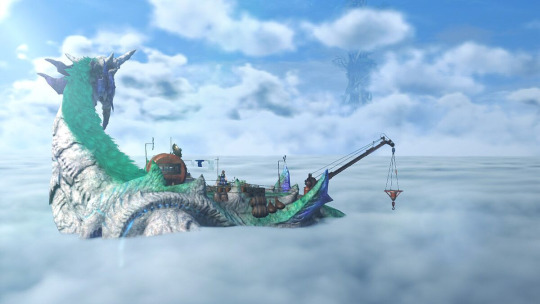
7 notes
·
View notes
Text

Last time I made a post that considered environmentalism, which was about Nausicaa of the Valley of the Wind, I linked an article about the 2050 deadline that we have for net zero emissions of carbon emissions. Now, writing with Xenoblade Chronicles 2 as a framing devise, a specific part of that article jumps to mind:
Crucially, this also includes developing and deploying carbon capture technologies to extract existing carbon dioxide from the atmosphere. Failing to meet this deadline will dramatically increase the risk of surpassing critical tipping points, potentially leading to runaway climate change with unpredictable and disastrous outcomes. Furthermore, even after reaching net-zero, it’s increasingly likely that active carbon removal will be essential to return to safe levels of greenhouse gasses.
Xenoblade Chronicles 2 is not a story about environmental conservation. It is a story about environmental restoration. It is a story where the world died and only a complex artificial process can bring about repair. It is a story about what is left to do after pushing nature past the point of resilience.
Humanity is now responsible for the extinction of many species and habitats, and for that alone, we would already have a moral duty to work towards restoration instead of waiting for mother nature to lick it's wounds. Now we probably should out of sheer need as we try to avoid a consequences of climate change interacting like falling dominoes. The message is absolutely relevant to the global crisis we are facing.
There is a marked difference, however. The question of what individuals can do.
Because in this game, the effort to restore humanity is huge. Human participation has a system in which it can contribute to restoration. Technology has been deployed literally around the whole planet, with nano technology seeking the material needed to restore the world. While the game is a search for answers, there are answers to find at the end of the narrative.
In real life, currently, humanity's environmental efforts are less one cohesive movement and more a series of desperate efforts, threatened by a wave of anti-intellectualism and lack of political interest. There is no readily available manner in which to participate in conservation efforts baked into the structure of daily life. Many individual's sorting for recycling efforts are lost to a city's garbage management answer: a landfill. One can try and stop wasteful consumption, reduce one's own carbon print, but in a world designed around consumerism, where the greatest emitters of greenhouse gases are huge corporations, the problem requires a systemic overhaul.
The hope becomes, therefore, that if there is no answer currently available, that we can come up with it as a global society facing a crisis.
2 notes
·
View notes
Text
Hi Eliza! I have to say that I agree with all the points made here, and I think our posts echo each other signficantly, but yours is by far more pleasant. I might, perhaps, been overly effusive on my points. There is, after all, a certain level of frustration that this movie maintains its relevance as commentary after 40 years, and some might argue it is more relevant than ever. I wish we, as in humanity, stopped shooting ourselves in the foot.
Nausicaä of the Valley Wind (1984) and Instrumentalism

Surprisingly, this was my first time watching this fantastic Studio Ghibli film, despite being an avid nature appreciator and longtime Studio Ghibli fan. The film's message about the need to find ways to live in harmony with nature is just as relevant today as it was when the film was first released 40 years ago.
The story centers around Nausicaä, princess of the Valley of the Wind. Though her small village is conveniently protected by purifying winds, the neighboring forest is seen as a dangerous place for humans, as it is home to toxic spores and giant insects that can easily kill. However, the forest isn’t what it first appears to be. Nausicaä, through her deep compassion and sensitivity, has developed a unique connection with the forest and its inhabitants. She comes to understand that the so-called “fearsome” creatures react out of fear, much like humans. She also learns that the forest itself isn’t inherently toxic. Rather, it’s the soil that has been poisoned by pollution from the industrial world. In fact, the trees are evolving to purify the air and cleanse the earth.
This insight draws a clear parallel to the environmental issues we face today due to anthropogenic activity: the degradation of land through unsustainable use, the emission of compounds that fuel global warming, and the mass pollution of ecosystems—from oil spills and industrial waste in rivers to the long-term impacts of radiation from nuclear disasters.
The film also challenges the viewer to consider how instrumentalism can be used when grappling with environmental collapse. Specifically, it raises a critical question: what path should humans take to protect ourselves from the very destruction we’ve caused? As Nausicaä demonstrates, the answer is not to fight fire with fire by hoarding destructive technologies out of fear. Instead, we must learn to understand the planet’s natural cycles and cooperate with them to protect humankind, the natural world, and the planet from our shared fate.
2 notes
·
View notes
Text
Nausicaa of the Valley of the Wind
Another Ghibli production with clear anti-war and envieromentalist messaging.

Here, the curse of the world, the toxins that are expelled into the atmosphere, are implied to be a result of human contamination during the industrial age, and interestingly, of massive fires produced by representations of war, which are the Giant Warriors (which I'll get to in a moment). It is made clear that places that have become uninhabitable for humanity are, in fact, recuperating. In these places, nature has had the time to, through natural processes, decontaminate the soil and the water. And humanity has unknowingly been benefiting from this purification.
However, because they cannot directly inhabit these places, humanity seeks to destroy them. Humanity seeks to burn down these places to modify them to human conditions, which would inevitably doom them, both because the purification of vital resources (like water) would stop, and because nature in this anime has very literal protectors which will strike back in retailation, the Ohms.
Seeing the world as it is, seeing how we continually exploit the soil and forests and the sea, bleeding them dry and indeed contaminating them, producing conditions which makes us deprive ourselves of resources due to a lack of sustainable practices, and producing what has been considered to be a sixth mass extinction due to the rate at which species are dissapearing, and the very looming threat of Global Warming, as a sort of ticking time bomb of consequence not unlike the stampeding Ohms, makes me think this is very assertive commentary of the fallacy of human action.
(Seriously, we need to have net zero greenhouse gas emissions by 2050 or large sections of the planet will inevitably become uninhabitable for human life. Under a certain level of heat your body cannot regulate internal temperature anymore and you would die.)
Of course, the humans in the anime have no idea how nature will react to their attempts to solve the crisis, ignorance gets in their way, and are too busy fighting to learn more. The only ones who learn the truth from Nausicaa (because she has been studying nature and has found the caverns of purified soil and water) immidiately jump in to help her stop the crisis. We, human of the real world, know exactly what is going to happen, why, what we can do about it, and the time frame we have to do it. Hopefully, we will react a little better than the humans in this anime because at least they have the excuse of not knowing.
Now about the anti war message tied in...
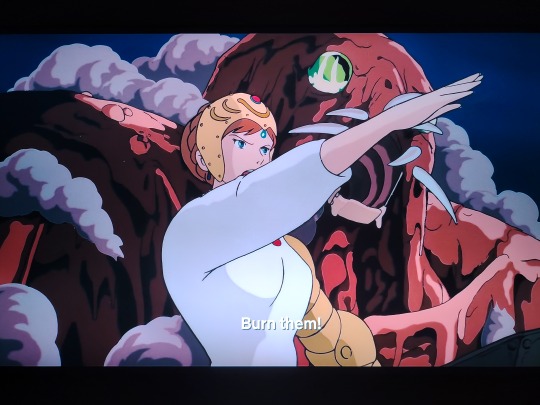
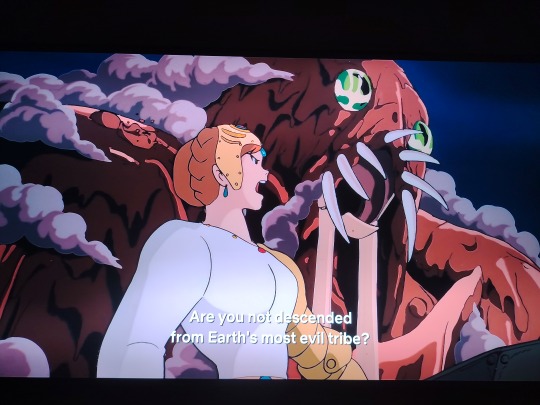
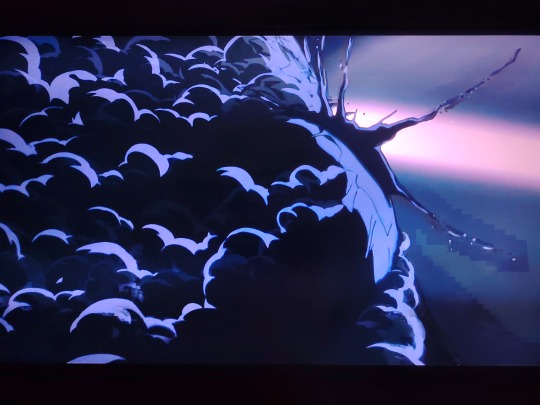
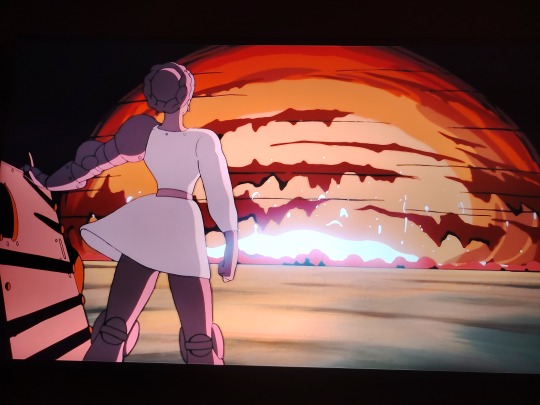
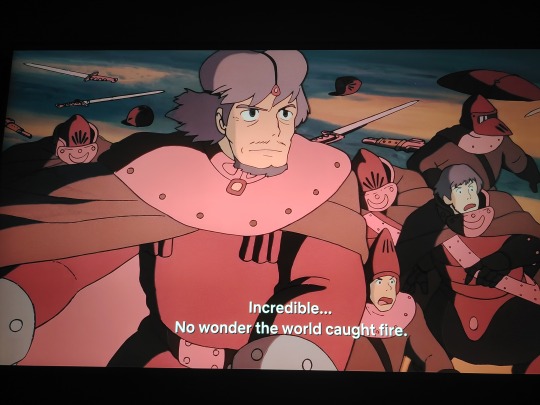
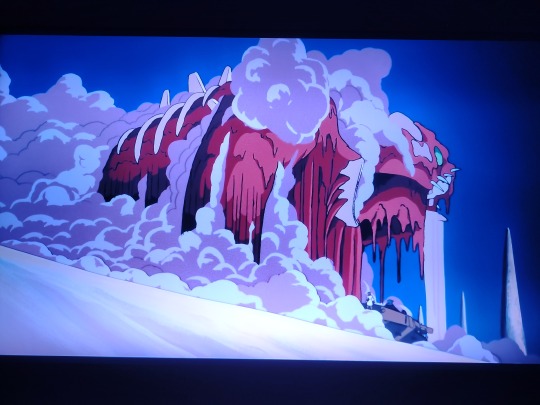
If you saw the Oppenheimer movie, you probably know that in making nuclear bombs, the scientists working on the project considered the possibility that the whole of Earth's atmosphere might get caught up in the chain reaction and we could have all, all life on Earth, have died. And then they tested the bomb anyway. And you know- maybe you did not think of a nuclear bomb while watching this movie. Maybe the skin melting off a humanoid figure after two, two, not one, explosions was not on the nose. I was looking at this scene with my mouth hanging open.
As I mentioned earlier, the characters in this movie, the humans, are too busy involving themselves in war, shooting first and asking questions later, to be able to communicate and know how to save themselves. They think their violent efforts are necessary and will lead to salvation. Some think that accumulating power under a single empire will allow them to save the world, so they go in soldiers first, attempting collaboration never. Their greatest weapon of mass destruction shoots directly at the symbolic consequence of harming nature, and they were, of course, still in a direct course for death.
They are saved by the protagonist, who is hinted at being a literal messianic figure, sacrificing her life in the process of giving something back to nature, and she is brought back to life as a symbolic representation of the forgiveness of nature.
So I would say the humans in this movie are quite lucky to have Nausicaa.
Maybe we will be as lucky. Hopefully we are not caught up in wars, at least three of armed nature, and we can do better.
Nausicaa, who throughout the movie is almost entirely consistent. She cares about all life, does not want anyone to die or be killed, even if they dirctly harmed her, and she respects, and tries to understand, nature. If there's a role model for anyone, she is it.
15 notes
·
View notes
Text
There's a lot that this series expresses without it leaving checkpoints of understanding. To be fair, I think it wants us to be moved, to be sucked in by the almost stream-of-consciousness turn the narrative takes. There's a couple times I felt close to crying without being able to truly comprehend why I was being overcome by emotions. I have also been doing assignments while watching the series, writing these posts while watching the series (part one while watching part 2 and part 2 while watching end and so on), so with that level of multitasking- that's impressive! I should have been disengaged enough not to be moved, but I was! So I think they really did something important here. I don't think they would have taken the sort of commercial risk of making a near incomprehensible ending and showing the protagonist essentially sexually harassing and then choking out such a beloved character if the team behind the story weren't trying to express something very specific that they cared about. And that sort of sincerity in storytelling, even with mixed results, its something I appreciate.
The End of Evangelion
Well, that’s another hard-to-process film. Man, this series really loves to throw around some trippy stuff. I kind of thought going into this film it was going to be a lot easier to understand, which it kind of was, but compared to the start of the series, Evangelion takes a crazy left turn. I just think it’s kind of funny that before I watched this series I thought it was just another mech anime, but it really goes deep into the painful struggles of its protagonists. I’m just going to skip over the hospital scene because I don’t really know what to say about it, plus it was talked about in the video. So Shinji throughout the series is constantly conflicted. He’s always struggling with his inner thoughts of inadequacy, isolation, and how everyone expects him to be a man. In this film, Shinji starts out not wanting to do anything. He wasn’t moving even when he had a gun to his head. It isn’t until the Eva kind of calls to him that he gets into it. After all the inner monologues and the dream sequences, Shinji chooses individual existence over a forced collective consciousness. I think that this shows a bit of character growth for him, because despite his struggle to connect with people, he still chooses to live separately even if it causes him pain. Asuka also had some growth over the series. She is constantly showing this confident outward strength, but at the same time she has this unresolved trauma, and, like Shinji, she also has an intense need for validation. In her final interaction with Shinji, she kind of lets down her mask for a second, even while being strangled.
Overall, I think I liked this ending better than the original. Probably because I was able to follow it a bit easier.

1 note
·
View note